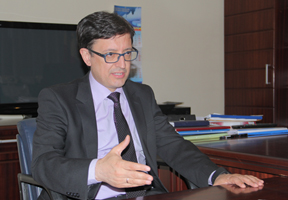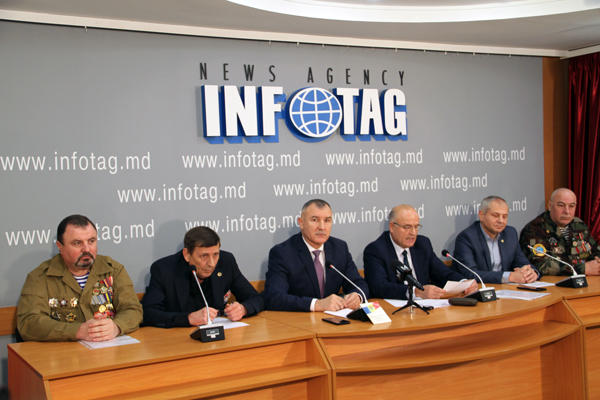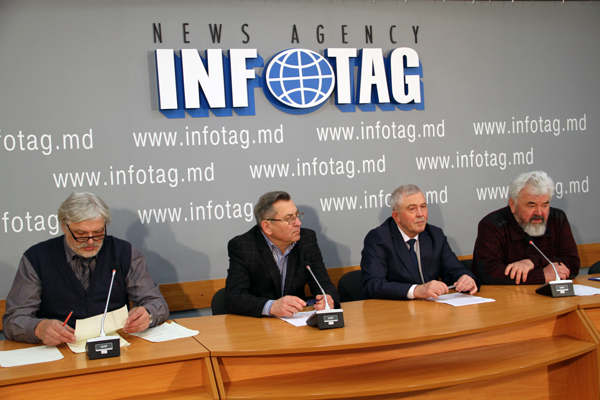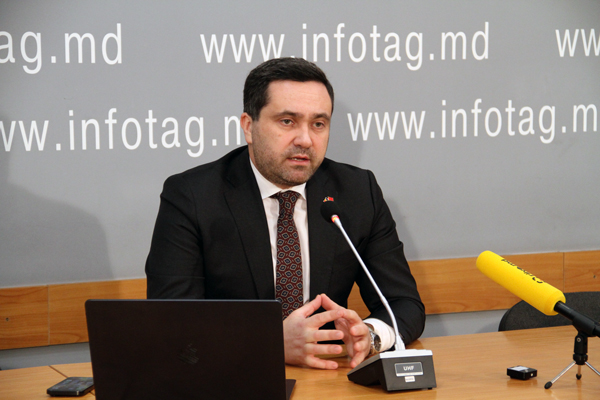Interview
FINANCE MINISTRY CONDUCTS REFORM IN PUBLIC PROCUREMENT FOR REMOVING CORRUPTION

Exclusive interview of Finance Minister Octavian Armasu to Infotag Agency Director Alexandru Tanas
Part 1. AGENCY FOR SOLVING CONFLICTS IN PUBLIC PROCUREMENT SECTOR TO BE SUBORDINATE TO PARLIAMENT
Question: Mr. Armasu, on May 1, 2016 the Law on Public Procurement entered into force in Moldova, after it had required certain changes at the stage of its implementation. What were they connected with?
Answer: Moldova registers certain calm in the sphere of public procurement: the state does not have money to make large purchases. Mostly, all the money is spent to payment of salaries, pensions and compensations. It is obvious that this is a temporary situation and it will not last forever. We regard namely this period as a very comfortable time for closely engaging in public procurement sector reformation.
I regard the new law that has come into force as an important step towards bringing the situation in this important sphere in line with European Union standards. However, the new law, which has been elaborated without my participation, has several shortcomings we are trying to urgently remove.
Q: Can you name which exactly are these shortcomings in the law?
A: The new law did not provide the creation of an independent agency for solving conflicts and complaints that traditionally appear after announcing results of tenders from participants. The document provides creation of such a structure within the PPA, which is controlled by the Finance Ministry. This obviously creates certain conflict of interest, even a potential for possible corruption actions.
Q: Is it you, the Ministry of Finance who could have had the opportunity to keep the entire control, who confesses this?
A: First of all, the availability of such structure in Moldova is demanded in the EU-Moldova Association Agreement. The agency must be an independent structure. Thus, the first that I demanded from my colleagues from the ministry is to develop a draft law on creating of a really independent agency for considering conflicts, which will be directly subject to the Parliament.
This agency will be made of 6 councilors – two from the Government, two – from the civil society and two – from the business community. In such format they should work with maximum transparency to exclude any complaints or allusions that procurement is conducted with violations, or what is worse, with elements of corruption.
Q: Can you theoretically suppose that this will completely exclude corruption component in the field of public procurement?
A: I cannot guarantee 100% that the corruption component will be excluded. However, I hope that we will be able to maximally remove it as a result of a deep reform.
Firstly, economic agents today do not have confidence that they can adequately protect their interests in cases when they understand that as a result of tender their interests were infringed.
Secondly, initially it was supposed to include the Agency into the structure of Finance Ministry, which would have created a certain corruption component. This is why we want to exclude it at the highest level. This is the first step we have already made. After that, the ministry completes the preparation of Regulations for conducting procurement.
The agency, aimed at considering conflicts, should be completely functional by September 1, 2016. I hope we will forever abandon the practice when a structure that is conducting public procurement is by itself considering complaints that arrive from procurement participants.
Q: Maybe at the beginning there will not be complaints to results of tenders for public procurement?
A: I think that there will always be different criticism and complaints, but the government has to strive that everything to be as transparent and clear as possible.
Within next stages we will deepen the reform of public procurements. In particular, the Finance Ministry is going to introduce the system of electronic procurement, which will allow us to maximally reduce the pressure of human factor, making all the procedures maximally transparent.
I have to admit that the Ministry is greatly helped by the European Bank for Reconstruction and Development (EBRD). The bank specialists have a rich practical experience and expertise in this field. With the EBRD assistance, electronic procurement system has been implemented in many Balkan countries, while recently it started working in Ukraine, also with the help of the EBRD.
Besides all this, we want to change the role of PPA, which is functioning within the Finance Ministry. Until now, it had the role of a kind of statist both in center and in raions. But the PPA has to become a leader, to carry out the organizational and guiding role. Its main goal will be the optimization of state procurement in the whole country’s territory.
I will say even more, the Finance Ministry wants to go in procurement directly to those, who are organizing and conducting tenders, signing contracts for supplying medications, materials, products and services for the public needs. Currently, these are too many, thus we have set a goal of their sector consolidation.
Part 2. Government Has Political Will For Deep Reforms And Structural Transformations
Question: How many organizations engaged in public procurement are there in the republic?
Answer: More than 4 thousand. This is why it is difficult to build up a correct process of procurement for them. They are in all raions, in each Ministry and agency. We will reduce their number. Here, there is an important aspect: for example many hospitals are buying medications and instruments by themselves. If we consolidate such type of procurement and conduct one big tender, we can get a considerable price advantage.
Q: What else will this reform contain?
A: After consolidation, we intend to take in subordination concessions and public-private partnership to exclude unpleasant excesses and to give transparency to both processes.
I have to say that the society has correctly raised the question about the future of state enterprises. Today they are not part of the public procurement process. I think we need to understand at the governmental level in which direction we are going to develop. If taking like a vision, it is clear that Moldova should not have many state enterprises. Until recently we had a state enterprise in the banking sector and everyone knows how the story ended. It is obvious that the government is not able to engage in everything.
If we want to privatize these enterprises, it is pointless to create a public procurement platform for them. We have to include in public procurement only enterprises that will forever remain in state property, for example, electricity, water, heating providers. Namely for these an efficient working platform for conducting public procurement should be created.
While the idea to take today all the state enterprises and create a joint system of procurement for them would be a wrong decision. Many of these enterprises are working in the open market, buying by themselves resources and materials for their needs. If we block procurement to them, with time these enterprises will become uncompetitive and will soon lose the market, which will lead to their inevitable bankruptcy.
This is how the Ministry of Finance imagines the main stages of reform in the public procurement sphere. These are aimed mainly at making procurements maximally transparent, so that they to be trusted by economic agents, the society and Moldovan foreign donors, who provide considerable financial resources to the country.
Q: Can you tell the expected effect from the reform in procurement sphere?
A: I think that real results may be achieved in short time. However, it is difficult to name concrete figures as the corruption component level is unknown so far. Hopefully, I cannot tell anything on this topic. I worked in a German company, where nobody is never paid unofficially, thus I do not know the price of the issue. All that I can tell is that reforms will allow to maximally eradicating the corruption component in the procurement sector and will give the opportunity to more efficiently administrate taxpayers’ money.
The quality of procurements also has a high importance. We want to run away from the one-side approach to cheap procurements, which seldom gives best economic results. The Ministry is determinate to implement a complex mechanism of assessment which is considering the effect during the project implementation, when there are joint efforts from all the segments. The main effect is given by the scale we are planning to achieve by means of procurement system reforming.
Q: Sorry for the question, will the reform be conducted completely during your mandate in the post of Finance Minister?
A: I hope that a lion’s share of what we planned may be implemented during my mandate. For this only the stability in the country is necessary.
Q: What about the political will?
A: It is obviously necessary and we do have it; all we need is political stability in the country.
Q: Thank you for your time, Mr. Armasu.
























Add Comment